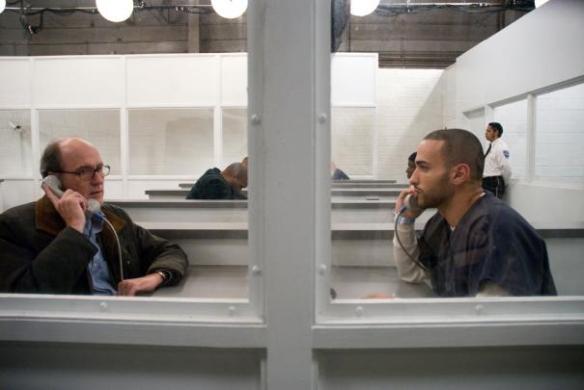(2020) Drama (Netflix) O.C. Ukeje, Chukwudi Iwujie, Indira Nascimento, Paulo André, Ike Barry, Yasmin Thin Qi. Directed by Matias Mariani
Some movies are more densely packed than others. This Netflix excursion tackles familial responsibilities, tribal myths, quantum physics (!), alternate realities, reincarnation, missing persons, Nigerian music, mental illness and the immigrant experience. This isn’t a film for the faint of heart.
Amadi (Ukeje), a Nigerian musician who was raised a part of the Igbo people, has journeyed across the Atlantic to Sao Paolo, Brazil’s most populous city, to find his older brother Ikenna (Iwuji). Ikenna, his mother’s favorite, is by all accounts a brilliant man and was pursuing a career in academics, a math professor at a technical university in the Brazilian city.
Except that the university he purports to teach at doesn’t exist, and while Amadi gets tempting glances of his brother from time to time (so he knows he is at least in the city), for all intents and purposes Ikenna has fallen off the map. In a city roughly the size of New York, finding one person who may not necessarily want to be found is not only nearly impossible but almost fiendishly cruel, but Amadi feels that this is how he wins the love and respect of his mother, who clearly prefers Ikenna, who has largely forsaken his family.
As Amadi delves deeper into the mystery, utilizing clues that might have stumped Sherlock Holmes, we discover that while not employed as a math professor per se, Ikenna was working on a physics issue that could revolutionize how we perceive reality – assuming that the Universe isn’t just a hologram, which is what Ikenna has come to believe.
The search for a missing person concept is a very cinematic one; it can be both thriller and character study. Through the search for the missing, we get to know them in ways we might not ever have had we just spoken to them. In this case, it’s doubly true; everything that Ikenna told his family back home is a lie, but everything he tells his friends in Brazil is also a lie. We begin to suspect that Ikenna is not the genius everyone thinks he is, but a con man who is playing both sides of the fence. Then again, he might have discovered a way to bridge two alternate realities (and maybe more); ot, he could be losing his mind.
We also get a sense of the exclusionary feelings that an immigrant feels in a city they don’t know and perhaps don’t understand. At one point (in fact, in the very scene depicted in the picture above), Amadi’s uncle (Igujie) refers to Sao Paolo as “a white person’s city” which may come to a shock to Americans who look as Brazilians as brown. Again, perceptions can differ depending on where you come from.
The visuals here are stimulating, from the cityscape of Sao Paolo with its sea of high rises, to the quantum representations of the mathematics that Ikenna was working on. It can be a hard slog at times – I don’t begin to pretend I understand game theory and quantum mathematics but at least I don’t feel talked down to.
A fellow critic compared this to the work of Darren Aronofsky and in some ways, that’s correct in that Aronofsky has a tendency to burn rubber where angels fear to tread. This is not a movie you can put on as background noise. It demands attention and focus and a willingness to let it transport you places you never thought you’d go. I like that despite all the fairly lofty ideas being bandied about here, I never felt talked down to and I never felt that I was drowning in concepts that were so far over my head that they aren’t even in the same solar system.
=That said, this isn’t going to be a movie everyone is going to want or even need to see. There are those who are absolutely opposed to movies that make you think, and would prefer movies that appeal to the emotional aspect of our humanity. While there are some scenes that are emotional in nature here, this is very much an intellectual film and those looking for light entertainment or mindless fun need to keep on scrolling past this in the Netflix menu. Those who appreciate a good intellectual challenge, however, can rejoice.
REASONS TO SEE: Ukeje has star potential. Glossy cinematography.
REASONS TO AVOID: Some of the mathematics content is a bit esoteric.
FAMILY VALUES: The themes, while not offensive, certainly are geared towards adults; kids will likely not have the patience for this.
TRIVIAL PURSUIT: The film has seven credited writers including Mariani; the others contributed expertise in mathematics, quantum theory, Igbo culture, and other aspects of the film; although these experts wrote no dialogue nor story, Mariani felt that they deserved credit and so all were given co-writing screen mentions.
BEYOND THE THEATERS: Netflix
CRITICAL MASS: As of 8/10/20: Rotten Tomatoes: 100’% positive reviews, Metacritic: 79/100
COMPARISON SHOPPING: Pi
FINAL RATING: 7/10
NEXT: Billie








